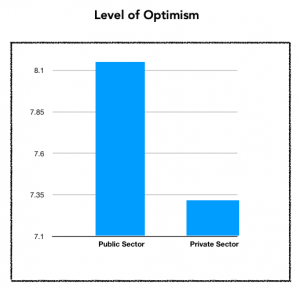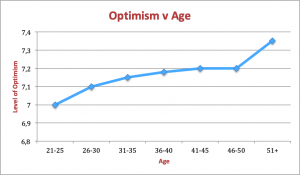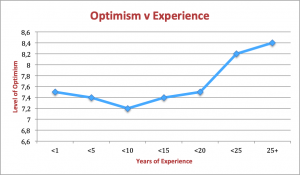Optimism is defined as being disposed to take a favourable view of events or conditions with the expectation of a positive outcome – or put more simply seeing the bright side of life.
But does optimism have any effect on performance? And if so, how can companies use the know-how to improve customer service?
During the past two years T2 has been involved in two company-wide initiatives to improve customer service: the first with one of the six big utility companies, British Gas plc, and the second with a UK Government Agency, DVLA. As part of both projects we have tested some interesting psychological and behavioural concepts that have a significant impact on customer engagement.
The research took a broad, overall look at the levels of optimism in each organisation. It focused on customer service teams dealing with millions of customers. In 2018, British Gas had 13 million customers and DVLA was responsible for dealing with 45 motorists.
Together over 1,000 call handlers completed T2’s Personality Profile Questionnaires and the results of each personality section of the questionnaire were correlated with the age, experience and the hobbies of each respondent. The aim of this research was to help employees develop personal insights into their psychological make-up, emotional intelligence and conflict resolution styles.
Staff in the public sector have a job for life, a pension, a career path and are confident about their futures. In the private sector, when respondents completed the questionnaire, the company was losing customers, was on the verge of being restructured and jobs were at risk. So the results in the figure above are not surprising.
Three additional and surprising results came out of the research.
Outcome Number One
Advisors aged between 40 – 51 were more optimistic.
It’s possible that this group had life experience to call on when dealing with customers, which made them more successful in their roles, which in turn generated greater personal satisfaction and made them pleased about their interaction with customers.
Being more mature than their younger colleagues, they may also have learned more about their personal strengths using these to greater effect in their jobs, whilst understanding their weaknesses and mitigating them. They may also have established themselves out of work, which boosted overall their feeling of well-being.
Outcome Number Two
Advisors who are more experienced are more optimistic.
These results show that newly recruited advisors are quite optimistic. It may be they have positive feelings of success having landed their jobs. Over time, the graph shows their optimism reduces.
After ten years in the job levels of optimism start to improve, dramatically. It’s possible that many advisors join these organisation as a temporary measure, but when they discover they like the work, they stay.
Certainly, those who have remained in the same position for 20 years would be highly-experienced and would have been exposed to a wide range of situations and a wide range of customers, so that they are fully confident in their abilities and on top of all the job requirements, reaching the level of unconscious competence.
Outcome Number Three
Advisors with active pastimes in all age groups are more optimistic.
This result appears to imply that advisors with active pastimes scored higher on the optimism scale than their colleagues because of the energetic nature of their hobbies. It may well be that many were involved in group activities – many talked about social drinking with friends, playing football or going to the gym. These are obviously people-related hobbies. It’s fair to speculate many would be extrovert.
Those with sedentary hobbies – reading, computer games, watching TV – tend to be less optimistic. It’s possible they may be introverted and less outgoing, while this does not necessarily lead to their being pessimistic, just less optimistic than their active colleagues.
Conclusion
The most significant implication of these findings is that HR Departments should consider optimism as a personality trait when selecting candidates for customer-facing jobs.
Moreover, they might like to factor in age, experience and hobbies into the mix.
Advisors working in the field of complaints do need a positive, optimistic outlook, or the nature of the job and the constant repetitive pressure of negative communication with customers would get them down.
—
Dr Henry Fabian, Registered Clinical Psychologist
Back to Blog




